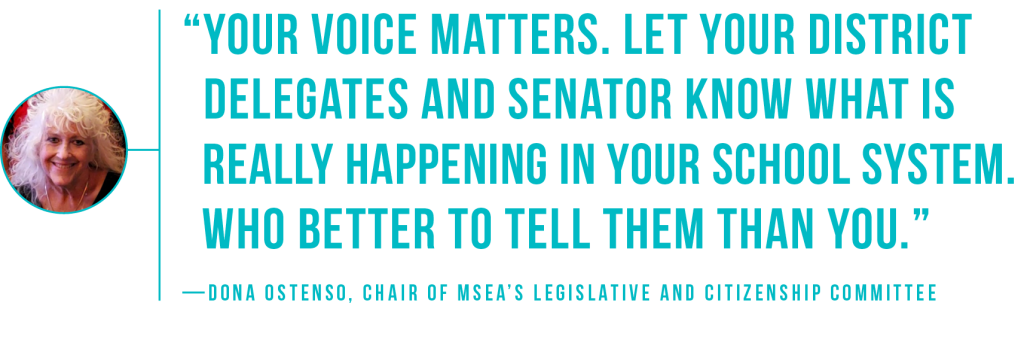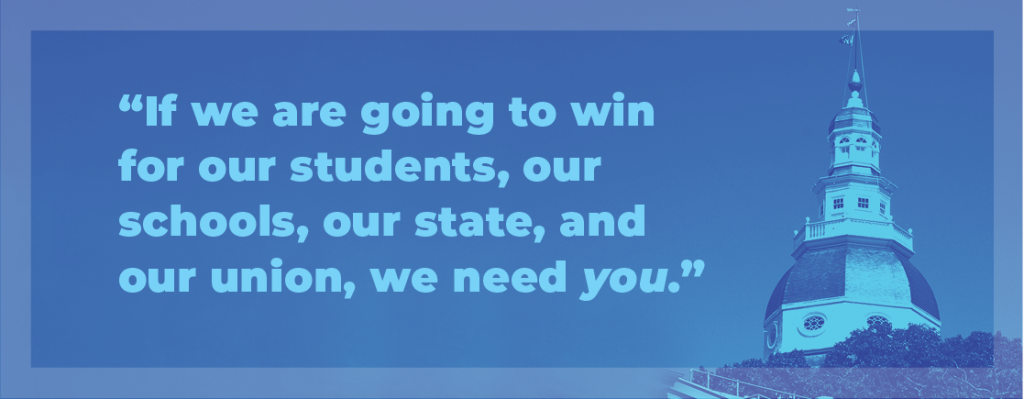MSEA’s 2024 Legislative Agenda

The 2024 General Assembly is an important opportunity to continue to build on the strong work and history of commitment to our public schools by the governor and the legislature. Record investments in public education are benefiting Maryland students across the state as we continue to recover from the pandemic while at the same time addressing historic educator shortages. We must take concerted actions to lay the groundwork for long-term success, support, and opportunities for all Maryland students.
MSEA’s 59-member Legislative and Citizenship Committee prepares and votes on the yearly legislative agenda. It is made up of the chair, MSEA Board of Directors, local presidents, the chair of the Retired Advisory Council, and five additional members.00

“Our 2024 legislative priorities continue to address the educator shortage, the workload of educators, and the ESP Bill of Rights,” said Dona Ostenso, chair of MSEA’s Legislation and Citizenship Committee. “The Maryland Educator Shortage Reduction Act was a major win in 2023, but it is just not enough. We must find a way to retain educators—both early career and veteran—and elevate the salaries of all educators while reducing the acute shortages and overwhelming workloads that make our work with students harder. I’m proud of the work we’ve done to state our position and use our voice to address these critical areas.”
Get the latest education news coming out of the Maryland General Assembly here.
Addressing the Educator Shortage, Excessive Workload, and School Safety While the legislature and governor made progress last session through the Maryland Educator Shortage Reduction Act, the pipeline of educators continues to be insufficient due to challenging working conditions and years of inadequate pay. This session all legislation must be considered through a lens of reducing excessive workload to combat educators leaving while making the profession more desirable and attainable.

While the Blueprint for Maryland’s Future has begun to make great strides in teacher pay, we must do all we can to get signifi cant raises to educators as soon as possible. The state must focus on retaining its current teaching force while continuing to build the pipeline of high-quality, diverse educators, and hiring more qualified mental health professionals and support staff to address student needs and disciplinary concerns.
Diversifying the Educator Pipeline Grow-Your-Own (GYO) programs, a time-tested and increasingly widespread strategy to recruit and retain a more diverse educator workforce, are investments by school systems to develop local educator pipelines through tuition support, mentorship, union partnerships, and more. Most Maryland school systems have already begun offering such programs using temporary grant funds, but to build on existing GYO models, they will need a permanent funding source with clear parameters. It is also time to re-examine testing requirements that too often pose barriers to diversifying the teaching profession. Research suggests that teacher certification exams are not strong predictors of teacher effectiveness, and racial disparities in scoring indicate bias within the tests. Creating multiple pathways, including passing the Praxis or a 3.0 GPA, allow for greater opportunities to recruit and retain quality educators.
Honest and Inclusive Education Although an overwhelming majority of people oppose banning books and resources, attempts by a few extremists to restrict inclusive content harm all children and distract from real areas of concern. “Maryland has not been immune to the book bans that target Black, Brown, and LGBTQIA+ authors and protagonists and curriculum challenges that threaten an honest and inclusive education,” said MSEA President Cheryl Bost. “We need clear policies that prevent the politically motivated censoring of books and curricula and affirm students’ rights to an education that accurately portrays history and reflects our diversity. We must ensure that Maryland’s curriculum standards are inclusive, updated, and reflect the experiences of historically marginalized groups.”
ESP Bill of Rights The threat of privatization of school services continues across the state. MSEA will advocate to establish guardrails around when school districts subcontract essential school services, including greater accountability and transparency from school districts and subcontractors. “Support staff and all educators must be protected from subcontracting practices that undermine the value of their jobs,” said Cindy Porter, co-chair of MSEA’s ESP Organizing Committee. “We need accurate and transparent information to ensure subcontracting practices do not threaten the quality of essential school services.”
Strengthening the Blueprint to Meet the Moment The need for the Blueprint and its successful implementation has never been more imperative for the future success of our schools and students. With any complex legislation, adjustments are identified and needed to finetune implementation. MSEA wants to address inequities across job categories in the career ladder and target educators who are working in shortage areas. Strategic improvements to the career ladder structure will help support current educators and assist in the recruitment of future educators, including mental health professionals.


